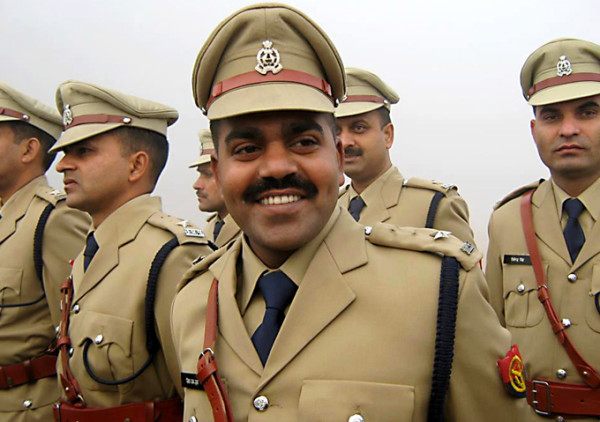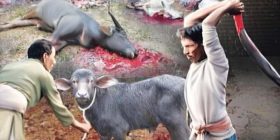In Pic :Silenced Zia-ul-Haq .
Murder charges and clashes with cops are nothing new for Raja Bhaiya. But his alleged role in the murder of a police officer could derail his charmed life.
FEW PEOPLE are able to maintain a life in politics coterminous with a life in crime. Raja Bhaiya, a strongman in Uttar Pradesh, has done exactly that for two decades. But comeuppance is the staple of the men of the mafia who straddle politics. Raja Bhaiya had his this week when an uproar over the killing of a policeman and two others near his hometown forced him to quit as a minister in the state’s one-year-old government.
If one goes by the criminal cases filed against him over the years, Raghuraj Pratap Singh, as the 46-year-old politician was named at birth, took to the life of an outlaw barely a year after he was old enough to vote. When he became a minister in the state government in March 2012 for the fifth time in 15 years, UP Police had 45 criminal cases against him. The Central Bureau of Investigation (CBI) is also probing him in two cases.
The latest charges emanate from the 2 March mob lynching and shooting of Deputy Superintendent of Police (DSP) Ziaul- Haq after he reached a village to investigate the killings, allegedly by Raja Bhaiya’s shooters, of the village chief and his brother.
The nickname Raja Bhaiya draws on his lineage as an upper-caste Rajput from a family of landlords that once owned vast stretches of land for generations. He is also known as Raja (king) of Kunda, the name of his hometown of about 35,000 people. It is widely known that he still controls enormous tracts of agricultural land as well as many illegal trading activities such as those relating to sand mining from the riverside. Those who are especially in his thrall also call him “noor-e-nazar” (the light of the eyes). Of course, he is also feared as the “Kunda ka gunda” (the don of Kunda).
“Kunda has been a hotbed of all kinds of anti-social activities and crime since Raja Bhaiya first became a legislator from there 20 years ago,” says Rajkumar Ratna Singh, the Lok Sabha MP from Pratapgarh, which includes Kunda. “Both the BJP and the Samajwadi Party are guilty of effectively protecting this criminal by making him a minister.”
Singh, who is from the Congress party, claims the slain police officer had been on Raja Bhaiya’s hit list as he had put an end to illegal sand mining allegedly carried out by Raja Bhaiya’s men near the Ganga river. The DSP, she says, was trying to enforce a Supreme Court ruling that most others had been frightened to implement. “Local policemen act like Raja Bhaiya’s servants,” says Singh. Zia-ul-Haq had dared to raid the mining site and seized trucks full of the illegal consignment that are still parked at the local police station. “That is why the policemen with him abandoned him and ran away. It was pre-planned murder.”
Few are shocked at the turn of events involving Raja Bhaiya. Mulayam Singh Yadav, who heads the Samajwadi Party that rules Uttar Pradesh, had made worsening crime under the previous government’s rule a key issue in his campaign for the 2012 Assembly election. But old-timers weren’t surprised when Raja Bhaiya wormed his way into the government of Yadav’s son, Akhilesh, who became chief minister after the Samajwadi Party won the election. The Yadavs need Raja Bhaiya to mollycoddle the Rajputs, who are numerically and politically significant in the state.
The last time Mulayam was chief minister, from August 2003 to May 2007, he had made Raja Bhaiya the food minister. That tenure resulted in the CBI filing a case over alleged embezzlement of hundreds of crores of rupees in a scheme to supply subsidised food to the poor. Filed in December 2007 after Mulayam’s bitter rival, Mayawati, became the chief minister, that case is still continuing. In her previous tenure during 2002-03, Mayawati had launched an all-out war against Raja Bhaiya and sent him to prison. Last year, Akhilesh had wanted to keep Raja Bhaiya out but his father overruled him. Raja Bhaiya’s tenure as prison minister was marked by violence by jail inmates, such as by a gangster named Brijesh Singh who had been brought from Gujarat. Last month, Akhilesh divested Raja Bhaiya of the prison portfolio.
Schooled in Allahabad, Raja Bhaiya almost didn’t graduate as his father believed that education made cowards of men. But his mother’s insistence saw him attend Lucknow University. But Raja Bhaiya was clearly no coward: by the time he turned 19, he had several criminal cases filed against him already. He debuted in politics in 1993, getting elected as an independent legislator at the age of 26 with the support of the BJP. Ironically, Mulayam had then opposed Raja Bhaiya as he was accused of masterminding anti-Muslim violence in a village of Kunda during 1991-92. Mulayam even disrupted proceedings in the UP Assembly for a week demanding police action against the newly elected legislator.
Raja Bhaiya, who has never joined a political party, has been the bugbear of every politician in the state at some time or the other. In 1996, BJP’s Kalyan Singh campaigned against him in the Assembly election only to be forced to make the strongman a Cabinet minister in 1997 when the BJP leader became chief minister. Two successive BJP chief ministers, including the current party president, Rajnath Singh, had retained Raja Bhaiya as their minister
HIS TROUBLES with Mayawati began when she formed a government in May 2002 with the BJP’s support. She resisted a push by the BJP, which had supported Raja Bhaiya in the election, to make him a minister. In much of rural Uttar Pradesh, the caste Rajputs are the worst tormentors of the lowest-caste Dalits, who are Mayawati’s core votebank. Raja Bhaiya mobilised Rajput MLAs of the BJP who opposed the coalition with Mayawati and spearheaded a dissident movement against her government. He was arrested in November 2002 after he allegedly threatened a BJP legislator.
Thus was Mayawati’s war against him launched. In two months, police would raid Raja Bhaiya’s palatial ancestral home in Kunda and recover, among other firearms, two AK-47 rifles. His father, Udai Pratap Singh, and a cousin, too, were arrested and booked under the Prevention of Terrorism Act (POTA) for allegedly conspiring to kill Mayawati. Over the next weeks, the police carried out more arrests in a bid to destroy what it said was Raja Bhaiya’s network of terror that, among others, ensured he lorded over public works and irrigation contracts running into crores of rupees. Famously, Mayawati also acquired a huge private lake on Raja Bhaiya’s estate that was home to crocodiles and named it Ambedkar Bird Sanctuary. This was a symbolic blow by a Dalit against a Thakur that made her a hero among the Dalits and him a symbol of injured Rajput pride.
When police attacked Rajput youths protesting the arrests, Mulayam launched a political campaign vowing to free them if he came to power. When he did become chief minister replacing Mayawati in August 2003, he promptly released Raja Bhaiya from jail and made him a minister. On her part, Mayawati decided to court the Brahmins, the upper-caste rivals to the Rajputs. Her lieutenant, Satish Mishra, addressed hundreds of Brahmin rallies and conventions across the state over three years. This brought her political gains in the 2007 election as the Brahmins and the Dalits helped her win an absolute majority in the Assembly. But she lost power again in 2012, beginning a revival in the fortunes of Raja Bhaiya as the Samajwadi Party won power.
Opposition leaders, however, believe that this time Raja Bhaiya may have tied Chief Minister Akhilesh, too, in knots. Raja Bhaiya has claimed that one of the key accused in the 2 March killings, Rohit Singh, had actually accompanied him to a meeting with Akhilesh. “Raja Bhaiya has created potential trouble for Akhilesh Yadav,” says Congress leader Pramod Tewari who is a legislator from near Kunda. Rohit Singh has more than a dozen cases of crime, including murder and criminal conspiracy, against him.
Since the 2 March killings, Raja Bhaiya has said he did not need to get the police officer murdered as he could have easily got him transferred out of Kunda with his influence as a minister. But sources in the police debunk that claim. Anil Kumar Rai, who has been transferred out as the Superintendent of Police in Pratapgarh, had stood up to Raja Bhaiya on postings and transfers, a senior police officer in the state told TEHELKA on the condition of anonymity. “Also, as the inquiry officer into last year’s communal violence in Kunda, Zia-ul-Haq had clinching evidence about Raja Bhaiya’s involvement in it,” the officer said. The slain police officer was shortly to submit his report to the government that would have reportedly pointed a finger at Raja Bhaiya.






Leave a reply